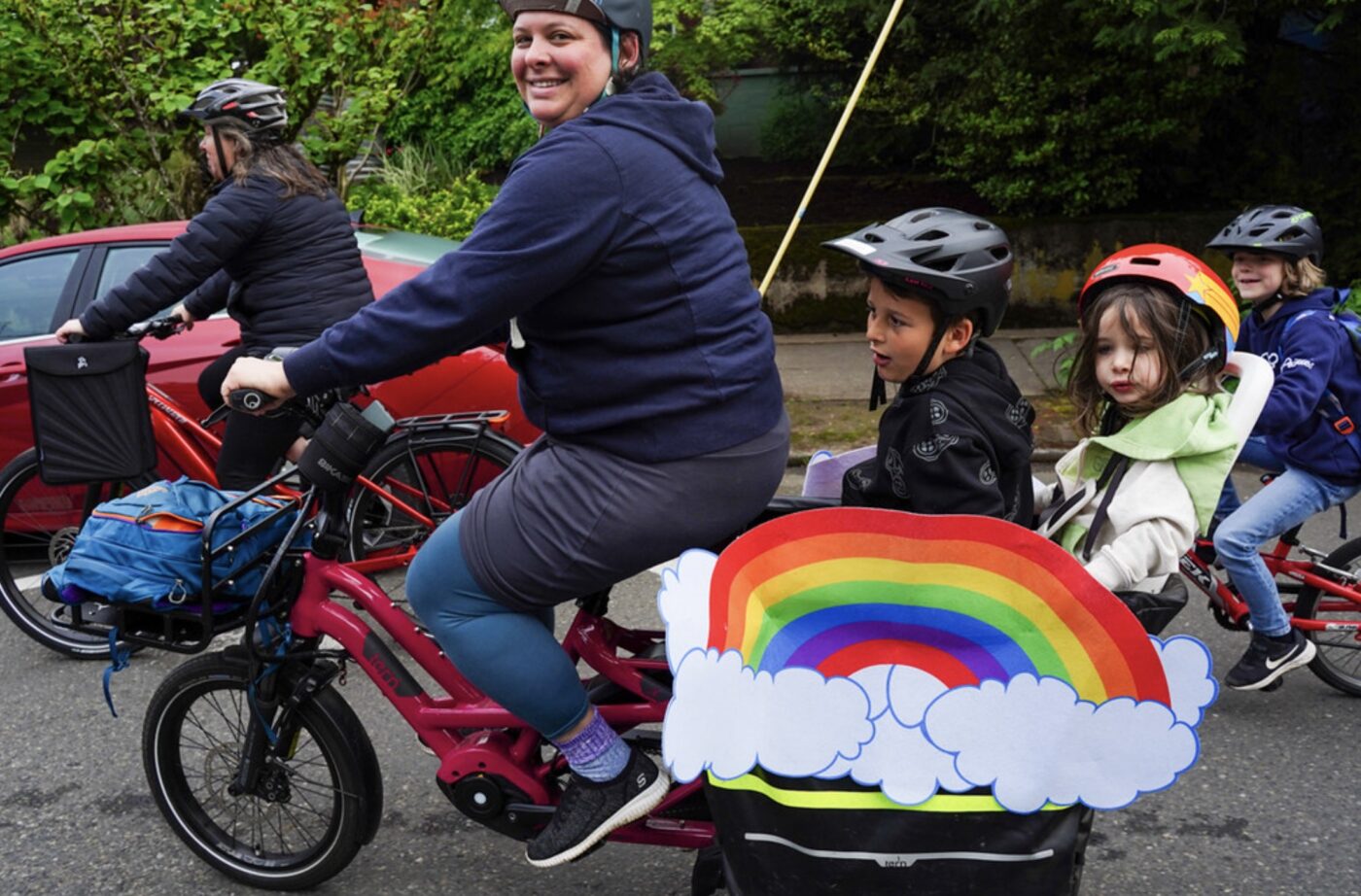The bike bus movement has been a decidedly grassroots phenomenon. Moms and dads have stepped up to organize rides at local schools and families have shown up to ride together. But as the trend matures and looks to expand beyond early adopters and reach its true potential, it needs a stronger foundation that must include help from local government to keep roads safe and welcoming for everyone.
“We’re saying, ‘Bring it on!’ Let’s figure out how to do this even better. We really welcome the partnership with bike bus advocates.”
– Kristin Hull, PBOT Planning and Project Delivery Group Manager
At a meeting of its Bicycle Advisory Committee last night, the City of Portland made it clear they are “all aboard” when it comes to the bike bus. Staff from the Portland Bureau of Transportation outlined three active projects worth about $650,000 that they’re working on to make bike bus routes safer.
“We’re saying, ‘Bring it on!’ Let’s figure out how to do this even better. We really welcome the partnership with bike bus advocates,” said Portland Bureau of Transportation Planning and Project Delivery Group Manager Kristin Hull.
Hull attended the meeting along with PBOT Traffic Safety Section Manager Dana Dickman. Their presentation was a direct response to Bike Bus PDX, a coalition of advocates who launched a pressure campaign directed on Portland City Council back in February. Their Bike Bus Friendly Neighborhood Greenway Resolution calls on PBOT to lower the average daily auto traffic volume threshold (from 2,000 cars per day to 500 cars per day) on 25 neighborhood greenway routes where active bike buses exist prior to the start of the 2025-2026 school year.
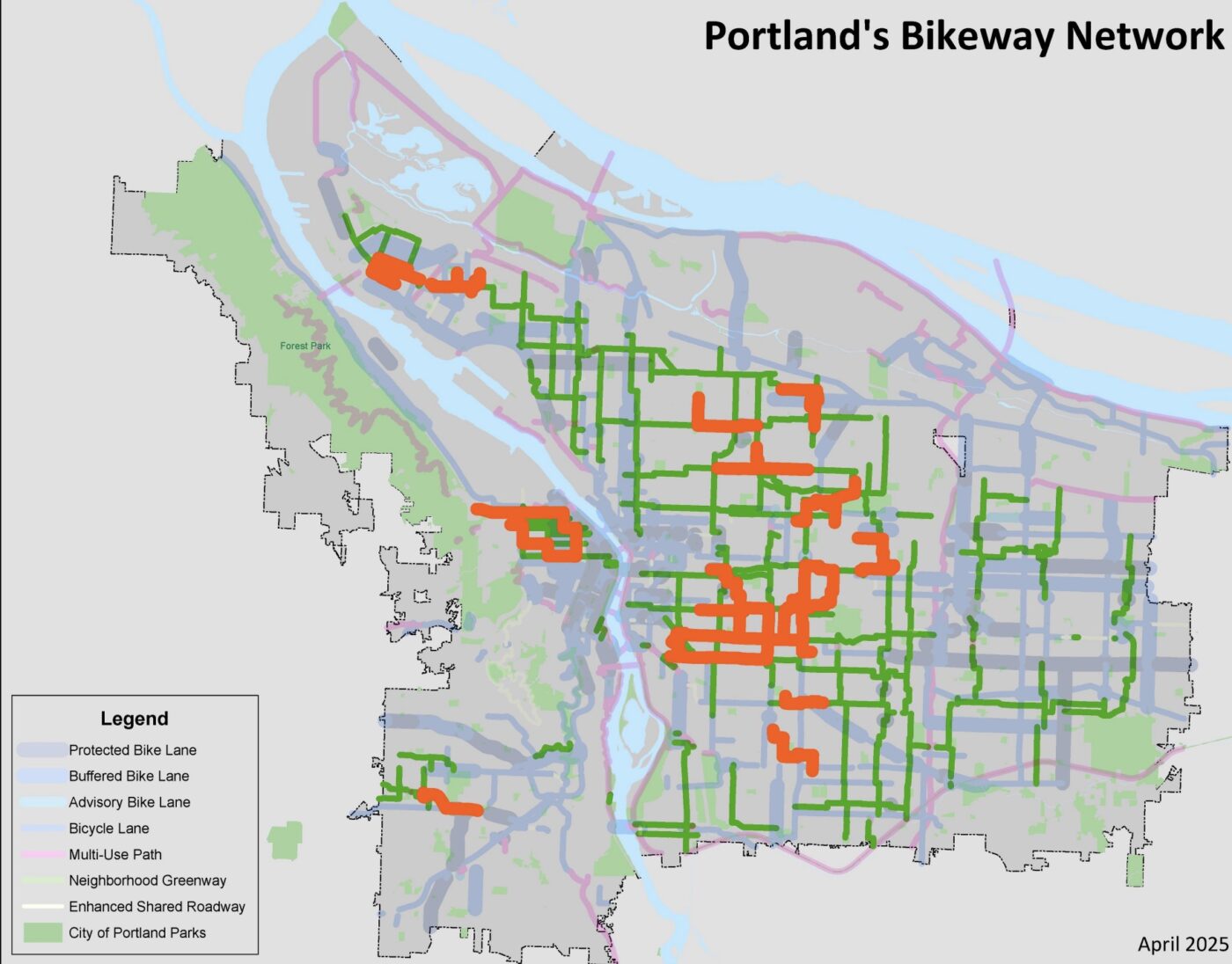
While PBOT strongly supports the concept, they revealed last night that they’ll only have funding to work on four corridors by next year. To help soften the blow of that reality, Dickman and PBOT Bicycle Coordinator Roger Geller outlined three active projects they’re working on to improve bike bus conditions: a $50,000 Metro grant for wayfinding and signage on bike bus routes, $100,000 from the General Fund for intersection safety improvements, and $500,000 from Fixing Our Streets program for improvements to neighborhood greenways used by bike buses.
The signage project is funded by Metro’s Regional Travel Options program. It will stoke bike buses at 10-11 schools by paying bike bus leaders and installing new signs and markings on the routes. The new signage is aimed both at drivers and bike riders. PBOT hopes people will drive more safely when they’re on a bike bus route, and they want people who participate in the bike bus to know where it’s safe to ride even beyond the school day. Bike bus leaders have heard from families that kids love riding and want to do it more often, but they face more dangers outside the safety of the group and aren’t sure where they should ride.
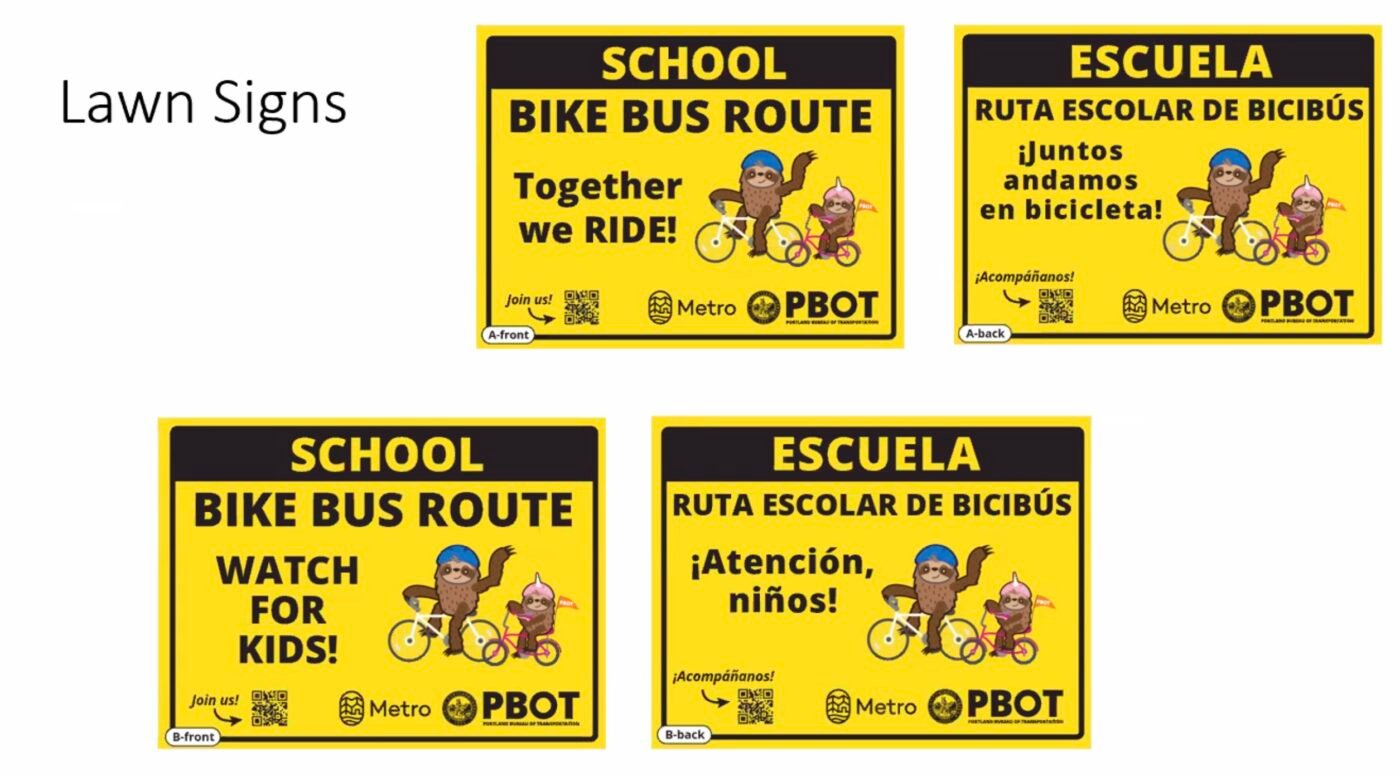
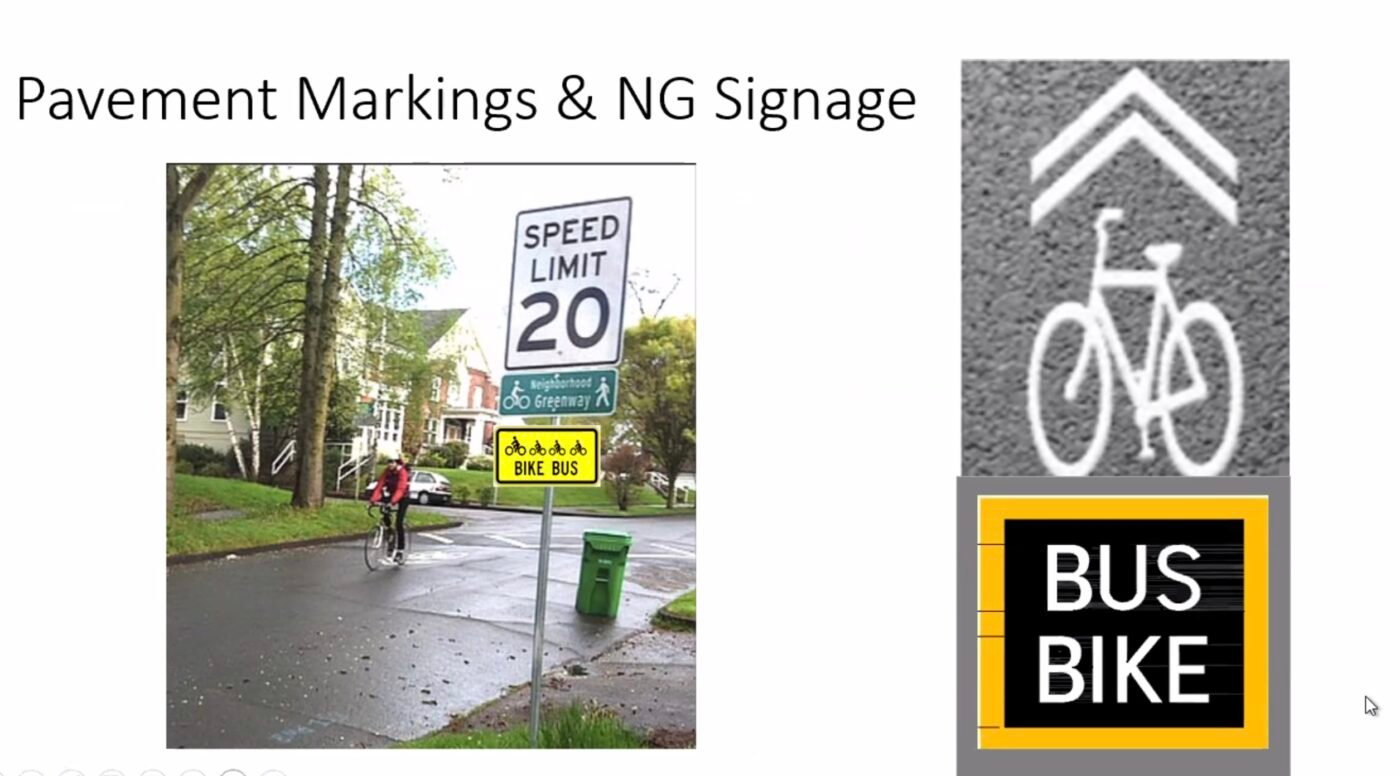
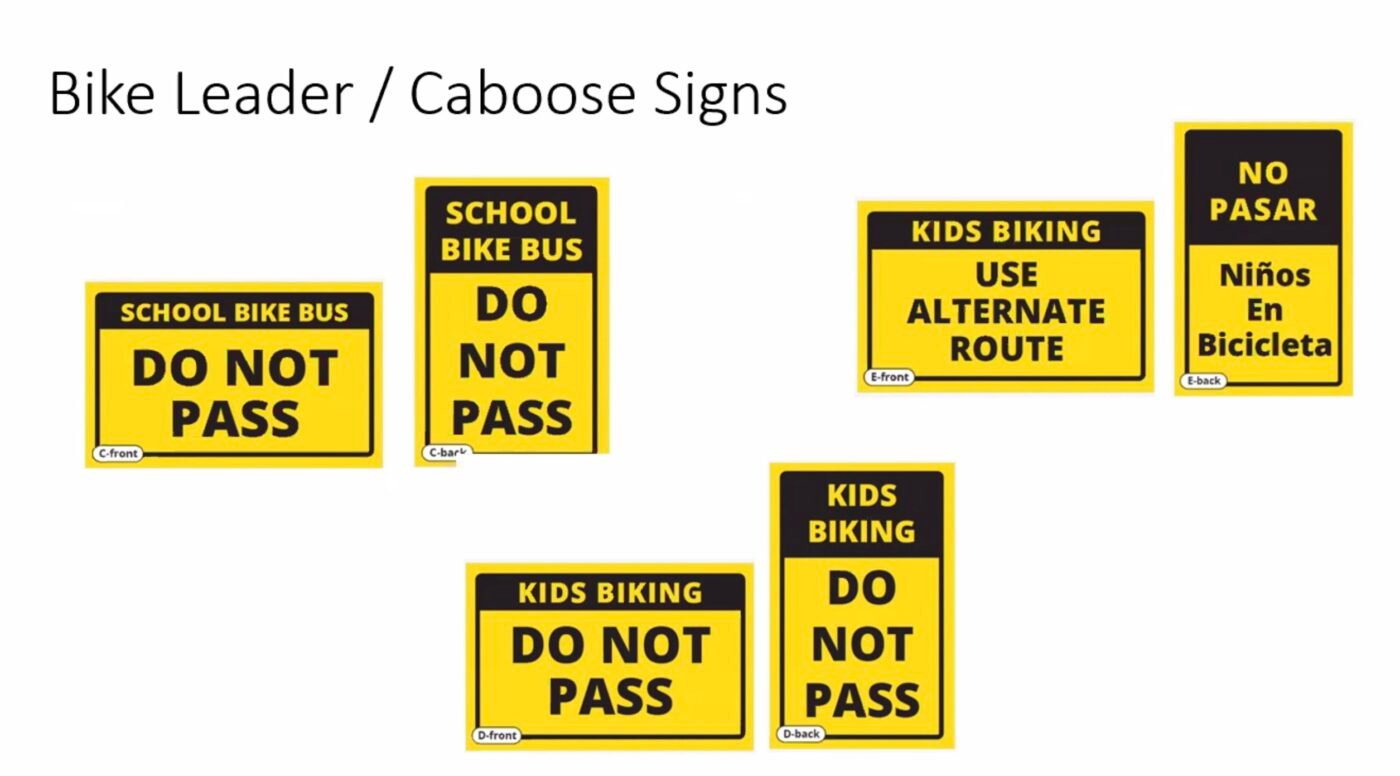
PBOT has developed lawn signs, rider signs (on existing street signs), “caboose signs” to be warn by bike bike bus leaders, and pavement markings that should start showing up sometime this summer. A pilot project to gauge impacts of the signs will begin this fall. Bike bus leaders will be paid $500-$750 to participate in the pilot and will be required to take surveys and stay in close communication with school communities and PBOT staff.
The $100,000 from the general fund will target intersection updates where bike bus routes cross busy streets. Any funds left over from that work will go toward daylighting intersections. PBOT says they’re looking at two intersections: SE 34th and Hawthorne and SE 34th and Division.
The biggest project will spend $500,000 to implement modal filters and other forms of traffic diversion on four (possibly five) bike bus routes along neighborhood greenways. PBOT says they’ll spend $100,000 this year developing the projects and doing any necessary public outreach and the remainder of the funds will go toward construction.
Geller said PBOT planning and engineering staff have already ridden with seven bike buses to observe conditions and receive feedback. “We’re hearing there are too many cars, side-street incursions, people not stopping at stop signs, poor motorist behavior, difficult intersections and chaotic conditions near schools where greenways overlap with parent drop-off.”
Since this project will include diverters and other infrastructure elements designed to constrain driving access, Geller told BAC members he believes they must help build community support to avoid driver backlash. “Some of the things [we want to build] are likely to be controversial in the community, particularly diversion,” he said. “So we really want to work to expand our constituency for these improvements and develop champions for identified projects.” Geller wants the BAC and local bike bus advocates to organize weekly bike rides at the schools to curry favor and spread awareness.
Geller says it will take a groundswell of community support to shake loose enough funding to treat all bike bus routes throughout the city. “We’re going to need more funding and decision makers are going to need to decide that they want to provide more funding, and that comes from political support,” Geller said. He warned against moving too quick with changes and said, “We cannot shove things in peoples’ neighborhoods,” because, “That kind of thing comes back to bite us and we don’t want to be one-and-done which threatens the long-term vision.”
“I just want to thank the bike bus advocates for creating this space for us to even have this conversation. Thank you. What an opportunity we have to seize their hard work to make a difference for what we want to do.”
– Jim Middaugh, Bicycle Advisory Committee chair
BAC Vice-Chair Joe Perez said the group should push back on PBOT and recommend treating more than four greenways by next year. But Chair Jim Middaugh urged support for PBOT’s proposal. Middaugh said given PBOT’s dire budget situation, the BAC should embrace the city’s support, even if it’s not as robust as activists are calling for. “That combination of external [Bike Bus PDX] and internal [PBOT] alignment is a really strong foundation for long-term gains,” he said. A majority of the BAC seemed to agree and will now work on a letter of recommendation for city council so PBOT can take their work to the next step.
In the end, this is a classic example of how community activism can speed up progress from PBOT. After all, we are all pushing for the same thing.
“All these kids that are out there biking are all future adult cyclists in Portland, and that’s really what we want,” Geller said. And BAC Chair Middaugh added: “I just want to thank the bike bus advocates for creating this space for us to even have this conversation. Thank you. What an opportunity we have to seize their hard work to make a difference for what we want to do.”
PBOT will choose at least one school from each council district. The schools have yet to be chosen. Expect a public engagement process to begin later this summer and work on the bike bus greenway improvements should begin in 2026.

